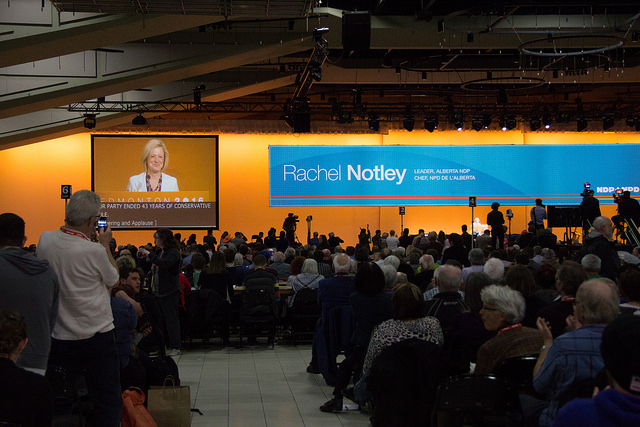Like this article? rabble is reader-supported journalism. Chip in to keep stories like these coming.
That silly Leap Manifesto — giving itself away right in the subtitle, which calls for “a Canada based on caring for the Earth and one another.” No wonder it provoked fury and outrage.
As my colleague Thomas Walkom pointed out earlier this week, reports of the manifesto’s scariness have been greatly exaggerated; its call for a transition from fossil fuels to green energy is solidly based in science and widely accepted.
So the ruckus over the document is the curious thing.
Now that we’ve sent Stephen Harper and his climate Neanderthals packing, we’re supposed to move on, confident that the planet is in safe hands under Prime Minister Justin Trudeau and Alberta Premier Rachel Notley, neither of whom have climate-denying skeletons jangling in their closets.
Amid this newfound contentment, the Leap Manifesto is a discordant prod, a reminder that the reassuring words of our new political leaders are undermined by their active promotion of more pipelines, which will lock us into fossil fuels for decades to come.
Notley, the darling of Canada’s progressives for single-handedly slaying a four-decade-old Conservative dynasty, was quick to denounce the manifesto as “ill-informed” after delegates at the NDP federal convention voted to debate it at the grassroots level for the next two years.
This led to a pile-on of media commentators outraged at the prospect of debate breaking out across the country.
Imagine the menace of citizens getting together to discuss what is to be done about climate change — which a 2003 Pentagon report described in cataclysmic terms, concluding it would lead to a future where “once again, warfare would define human life.”
Of course, Notley is in a tough spot. Alberta’s disastrous economic situation — for which she bears no responsibility — would be much better if past Alberta governments had imposed higher oil royalties and used the proceeds to diversify. Norway did that, and is comfortably surviving the oil price collapse astride a $1-trillion heritage fund.
The NDP premier is struggling to keep Alberta’s powerful oil lobby onside, offering up the promise that her credibility as a progressive could win them the “social license” they need for further oilsands development.
But this requires she take action on climate, or at least appear to.
Hence, her widely touted Climate Leadership Plan demands tough reductions in greenhouse gas emissions — from some sectors. Against the oil industry, it wields a feather.
While other sectors must cut emissions, the oilsands — Canada’s fast-growing source of emissions — will be permitted to actually grow by 43 per cent, notes Gordon Laxer, professor emeritus of political economy at the University of Alberta and author of After the Sands.
Trying to reduce emissions while allowing the oilsands to grow by 43 per cent is like trying to reduce lung cancer while giving away cigarettes at Canada’s Wonderland.
If, for instance, Parliament were to pass the Climate Change Accountability Act (introduced by the late NDP leader Jack Layton and passed by the House of Commons during minority governments in 2008 and 2010), the continued growth of the oilsands at the pace Notley prescribes would present an enormous problem.
Under such a scenario, Laxer says, oilsands emissions would take up fully 84 per cent of Canada’s total allowable emissions by 2050, leaving little room for Canadians still struggling to wean themselves off fossil fuels.
What’s needed is clearly more than the post-Neanderthal Canadian political world is offering. What’s needed is, as Bernie Sanders might say, a revolution.
That’s a daunting challenge, but not an impossible one — with resolute political leadership.
Let’s recall the unwavering campaign launched by then finance minister Paul Martin to reduce the federal deficit “come hell or high water!” In the name of appeasing disgruntled bondholders in New York, Martin took an axe to federal spending, resulting in thousands of Canadians losing their jobs and millions more suffering under “austerity.”
The transition off carbon could be less painful, since, with proper investment, a green technology future promises to be, in the words of NDP elder statesman Stephen Lewis, “the greatest job creation program on earth.”
So rather than fearing the Leap Manifesto, I say bring it on. It — or something like it — should be debated in every classroom, church basement, union hall and Tim Hortons.
It’s time we considered the possibility that saving the planet is as important as placating a bunch of New York bondholders.
Linda McQuaig is a journalist and author. Her most recent book (with Neil Brooks) is The Trouble with Billionaires: How the Super-Rich Hijacked the World and How We Can Take It Back. This column originally appeared in the Toronto Star.
Photo: United Steelworkers/flickr
Like this article? rabble is reader-supported journalism. Chip in to keep stories like these coming.



